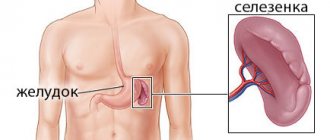- Outpatient department
Outpatient department » - Gastroenterology
Gastroenterology »
- About the direction
About the direction »
- Gastritis: symptoms, diagnosis and treatment
Gastritis is perhaps the most common disease of the gastrointestinal tract. Almost every second resident of our country suffers from it. That is why it is so important to know the first signs and symptoms of this disease in order to start treatment on time and not neglect your health.
Gastritis (from the Latin gastritis, from the ancient Greek γαστήρ (gaster) - “stomach” + -itis inflammatory or inflammatory-dystrophic changes in the mucous membrane) is a collective concept that is used to refer to various inflammatory and dystrophic changes in the gastric mucosa. Damage to the mucous membrane can be primary, considered as an independent disease, caused by poor nutrition, and secondary, caused by other infectious and non-infectious diseases or intoxication.
Types of gastritis
Acute gastritis
In modern medicine, there are several types of acute gastritis:
Simple (catarrhal) gastritis develops as a result of ingestion of stale food contaminated with pathogenic microbes (foodborne toxic infection), rotavirosis, allergies, or as a result of damage to the gastric mucosa by medications. With catarrhal gastritis, the surface layer of the mucous membrane is destroyed, which is quickly restored after the cessation of the irritating factor.
Corrosive (erosive) gastritis. This type of gastritis develops after concentrated acids or alkalis enter the stomach, which corrode the gastric mucosa. In this case, not only the superficial, but also the deep layers of the gastric mucosa are destroyed, so this form of the disease often gives rise to peptic ulcers or the formation of scars.
Phlegmonous gastritis is a purulent inflammation of the stomach that can develop as a result of penetration of a foreign object (for example, a fish bone) into the stomach wall with subsequent infection of this area. A distinctive feature of this type of gastritis is high fever and unbearable pain in the epigastric region. Phlegmonous gastritis requires immediate surgical intervention, as it can develop into peritonitis (extensive inflammation of the abdominal organs) and be fatal.
Fibrinous gastritis. It occurs very rarely against the background of sepsis (blood poisoning).
With proper treatment, acute gastritis (depending on the form) lasts up to 5 - 7 days, but complete recovery of the stomach occurs much later.
Often acute gastritis can become chronic.
Chronic gastritis
Chronic gastritis can develop as a consequence of acute gastritis or as an independent disease. Its danger lies in the fact that it can occur for a long time without showing any symptoms.
In the development of the disease, as a rule, there are periods of exacerbation and remission. During periods of exacerbation of chronic gastritis, short-term attacks of pain, discomfort in the upper abdomen, a feeling of heaviness, nausea after eating, and heartburn may appear, which indicates a dysfunction of the natural “valves” of the stomach and the reflux of acidic stomach contents into the esophagus.
A characteristic feature of chronic gastritis is the gradual growth of connective tissue in the gastric mucosa, replacing the cells that produce gastric juice (atrophy of the gastric mucosa). Chronic gastritis is often accompanied by a decrease in the production of gastric juice and acid (hypoacid gastritis).
Helicobacter pylori infection, which parasitizes the stomach, disrupts the renewal processes of the mucous membrane; thus, when old cells die, new ones cannot be formed. This leads to gradual degradation of the gastric mucosa with loss of function of the glands that produce gastric juice.
general characteristics
With insufficient salivation, constant dryness of the mucous membrane, burning and discomfort (burning mouth syndrome), and difficulty speaking are felt.
It becomes difficult for the patient to chew and swallow solid food. Some patients constantly drink water or use special formulations to maintain epithelial moisture. When examining the oral cavity, a small amount of viscous saliva, loss of shine and dryness of the mucous membrane are noted, and surface defects of the epithelium are detected. Saliva has trophic and protective properties for tooth enamel, so with xerostomia, teeth are affected by caries. The absence of lysozyme and nuclease causes a decrease in primary immune defense, which leads to candidiasis, manifested by a white coating on the epithelial membrane. Dryness and cracks in the lips are observed, and angular cheilitis often forms - long-term non-healing “jams” in the corners of the mouth. Elderly patients may complain of constant trauma to the mucous membrane when wearing prostheses.
Causes of gastritis
The main causes of gastritis are:
- poor nutrition;
- hasty eating and poorly chewed food or dry food;
- eating food that is too hot or too cold;
- eating savory foods (mostly spicy and highly salted);
- smoking;
- alcohol consumption;
- stress;
- infection with the microbe Helicobacter pylori;
- chewing gum on an empty stomach.
Symptoms of gastritis
So, how can you recognize that you have begun to develop gastritis? It is worth listening to your body and analyzing why pain bothers you, at what time it occurs and how often it happens.
Symptoms of gastritis:
- abdominal pain: sharp paroxysmal or constant painful;
- nausea is constant or intermittent, often occurring immediately after eating;
- heartburn;
- belching with a sour smell;
- repeated vomiting (in the case of acute gastritis, vomiting with blood is possible, since internal bleeding may open in the stomach);
- increased salivation;
- sometimes dry mouth;
- bowel dysfunction: constipation or diarrhea;
- from the whole body: severe general weakness, dizziness, headache, sweating, increased temperature, decreased blood pressure, increased heart rate - tachycardia;
- decreased appetite;
- unpleasant taste in the mouth;
- feeling of heaviness in the stomach after eating;
- bloating, rumbling in the stomach, flatulence;
- anemia, brittle and dry hair, split nails.
Causes of dry mouth
There are more than enough reasons for dry mouth. Normal hydration of the oral mucosa with saliva depends on many factors. Globally, the appearance of a feeling of dry mouth can be caused either by a qualitative and quantitative disturbance in the composition of saliva, or by impaired perception of its presence in the oral cavity. The central mechanisms for the development of dry mouth can be:
- Local changes in sensory receptors of the oral cavity;
- Disturbance of trophic processes in the oral mucosa;
- Disturbances in water metabolism and electrolyte balance in the body;
- Increased blood osmotic pressure;
- Exposure of the body to toxic substances from the environment and internal intoxication;
- Violations of the nervous and humoral regulation of saliva production;
- Mechanical drying of the mucous membrane with air;
Possible diseases that cause dry mouth:
- Diabetes. Typically, dry mouth that first appears and is persistent is a sign of this disease. If it is combined with excessive urine output per day, then the diagnosis becomes obvious, even without additional examinations;
- Prolonged exposure to high temperatures or sleeping with your mouth open, when elementary drying of the oral mucosa occurs in the morning;
- taking medications (antibiotics, drugs for the treatment of hypertension, etc.);
- Dehydration (prolonged vomiting, diarrhea, insufficient water intake);
- Oral diseases;
- Diseases of the brain and nervous system, when the normal regulation of salivary secretion is disrupted (stroke, circulatory disorders, Parkinson's and Alzheimer's disease, trigeminal neuritis);
- Alcohol and other types of external intoxication;
- Smoking abuse;
- Diseases of the digestive system (gastritis, peptic ulcer, hepatitis, pancreatitis, etc.);
- Acute purulent diseases and infections;
- Acute surgical pathology of the abdominal organs (appendicitis, cholecystitis, perforated ulcer, intestinal obstruction).
The most common cause of constant dry mouth in young and middle-aged people who have no visible prerequisites for its occurrence is diabetes. Therefore, first of all, you need to eliminate this problem!
If diabetes is not confirmed, further diagnostic search can be carried out by detailing dry mouth and its combination with other symptoms.
Dry mouth in the morning
There are situations in which dry mouth appears only in the morning. This, as a rule, indicates problems associated with local causes or is a natural manifestation of external influences on the body. Dry mouth in the morning goes away on its own some time after waking up. After all, the main mechanism for its appearance is mechanical drying of air during sleep when breathing through the mouth (snoring, problems with nasal breathing). Almost always, after drinking alcoholic beverages, dry mouth appears in the morning.
Dry mouth at night
Dry mouth at night requires more precise detail, since the causes of its occurrence are more serious compared to morning dryness. This can be as simple as drying out of the mucous membrane in the air or overeating at night, or diseases of the nervous system. At night, the secretion of saliva decreases in every person, and with impaired innervation of the salivary glands, this process is disrupted to an even greater extent. Sometimes constant nighttime dry mouth is evidence of chronic diseases of the internal organs.
Find out more:
How to lower blood sugar levels?
Diagnosis of gastritis
Today, the main way to determine gastritis is fibrogastroduodenoendoscopy or FGDS, which consists of studying the condition of the inner surface of the stomach using a probe, as well as a biopsy - removing a small fragment of tissue for examination.
FGDS makes it possible not to confuse gastritis and ulcer and to determine the type of disease: erosive or non-erosive.
Also, a gastroenterologist, to make a correct diagnosis, may prescribe the following tests:
- General blood analysis.
- Fecal occult blood test.
- Histological examination of a biopsy specimen of the gastric mucosa.
- Cytological examination of a biopsy specimen of the gastric mucosa.
- Two tests for the determination of H. pylori.
- Blood chemistry.
- General urine analysis.
Diet for gastritis
For gastritis with low acidity
Can:
- boiled lean meat: chicken, rabbit;
- meat broths;
- lean fish: pink salmon, hake, cod;
- vegetables in the form of puree or grated: carrots, potatoes, green peas, beets;
- ground fruits, compotes and jelly from apples, raspberries and strawberries;
- porridge (oatmeal, semolina, rice);
- low-fat cottage cheese, milk;
- only squeezed cabbage juice;
- alkaline mineral waters, for example Borjomi (1 glass an hour before meals).
It is forbidden:
- hot and spicy dishes;
- canned food;
- mustard;
- pepper;
- onion;
- hot sauces.
For gastritis with high acidity
Can:
- pureed vegetarian soups;
- dairy products;
- lean fish and boiled meat;
- scrambled eggs;
- porridge, jelly, jelly;
- vegetable purees;
- compotes from fresh (not sour) fruits;
- carrot juice;
- White bread.
It is forbidden:
- coffee and strong tea;
- meat broths;
- smoked meats;
- mustard;
- onion;
- garlic.
For all types of gastritis, split meals are very important - 5-6 times a day.
Gastritis (from the Latin gastritis, from the ancient Greek γαστήρ (gaster) - “stomach” + -itis inflammatory or inflammatory-dystrophic changes in the mucous membrane) is a collective concept used to refer to inflammatory and dystrophic changes in the gastric mucosa of different origins and course. Damage to the mucous membrane can be primary, considered as an independent disease (due to poor nutrition), and secondary, caused by other infectious and non-infectious diseases or intoxication.
Gastritis is perhaps the most common disease of the gastrointestinal tract. Almost every second resident of our country suffers from it.
If you are really looking for your doctor...
Diseases of the respiratory system.
Diseases of the respiratory system are a large group of diseases and conditions that can cause dry throat and require mandatory treatment under the supervision of an ENT doctor. Typically, such diseases are accompanied not only by dryness, but also by other symptoms: runny nose, frequent pain, cough and sore throat. If these symptoms appear, you should definitely contact an ENT doctor for an examination.
What diseases of the respiratory system cause dry throat?
- Acute respiratory viral infections, flu, colds. In addition to a dry throat, the patient has the following symptoms of colds and acute respiratory viral infections: fever, cough, nasal congestion, pain in muscles and joints, weakness, loss of appetite. Treatment is symptomatic: lowering the temperature, eliminating cough and runny nose with medications, as well as drinking plenty of warm fluids.
- Pharyngitis is an inflammation of the mucous membrane of the pharynx. Pharyngitis can be acute or chronic. Based on the nature of the changes in the mucous membrane, catarrhal pharyngitis is distinguished, when swelling of the tissues is observed, hypertrophic, when the mucous membrane thickens, and atrophic pharyngitis, when the mucous membrane, on the contrary, becomes thinner. Attacks of dry cough, red throat, discomfort during swallowing, sore throat - all these symptoms are signs of pharyngitis. Pharyngitis can simultaneously be paired with tonsillitis (inflammation of the tonsils) or laryngitis (inflammation of the larynx). In this case, the patient is diagnosed with tonsillopharyngitis and laryngopharyngitis. The patient is prescribed anti-inflammatory, antibacterial drugs, gargling, irrigation with antiseptics and physiotherapy (to consolidate the positive results from the action of the drugs and speed up the recovery process).
- Tonsillitis. The acute form of tonsillitis is called tonsillitis. If a sore throat is not treated in time, the disease will become chronic, with exacerbations occurring up to several times a year. Unlike pharyngitis, tonsillitis affects not the pharyngeal mucosa, but the palatine tonsils (tonsils). A sore throat occurs with acute pain in the throat, high body temperature, and a white coating or purulent accumulations appear on the tonsils. An effective means of combating sore throat is high-quality antibiotic therapy prescribed by an ENT doctor and physiotherapy performed in an ENT clinic. Chronic tonsillitis is not as severe as a sore throat, but its symptoms also cause the patient considerable discomfort: elevated body temperature, bad breath, sore throat. On the tonsils, purulent plugs are noticeable - accumulations of compressed streptococcus. Plugs support inflammation in the tonsils, so it is imperative to get rid of them. Effective therapy for chronic tonsillitis should be comprehensive and include treatment with medications, rinsing the tonsils from plugs and physiotherapy. In the absence of proper treatment, tonsillitis causes complications in the heart, kidneys and joints.
- Laryngitis is an inflammation of the larynx, which is accompanied not only by dryness, but also by severe itching, barking cough, hoarseness in the voice and itching in the throat, as if the throat is being “teared” from the inside. The treatment regimen for laryngitis includes taking antibacterial or antiviral agents, antiseptic drugs, antitussives, and physiotherapeutic procedures. Also, during treatment it is necessary to give up alcohol, smoking and avoid overstraining the vocal cords. Moisturizing and softening the throat is achieved by drinking plenty of fluids (herbal teas, fruit drinks, compotes, etc. are suitable)
- Pharyngomycosis (or fungal pharyngitis) is an inflammation of the pharyngeal mucosa, the causative agent of which is a fungal infection. Often the disease occurs due to uncontrolled use of antibiotics. The disease occurs with dryness, severe burning, discomfort and pain in the throat. A cheesy coating is noticeable on the mucous membrane of the throat. Therapy consists of taking antifungal, anti-inflammatory drugs, gargling and irrigating the throat with antiseptic drugs. Physiotherapy is an excellent addition to drug therapy.








